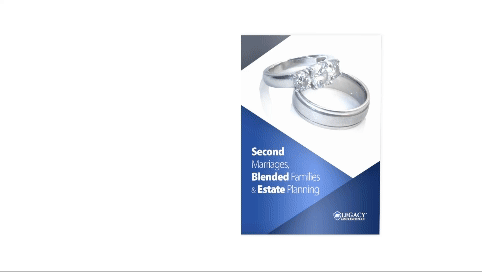Blended families have become increasingly common in today's society as the traditional family model of a married couple with biological children has shifted. This transformation can be attributed to changes in social norms and attitudes toward marriage, divorce rates and the trend toward cohabitation. As a result of these shifts, estate planning for modern families has become even more important than ever to ensure that all family members are adequately protected and provided for far into the future.
With the rise in divorce rates and remarriages, it is not uncommon for individuals to enter into new relationships with partners who have children from previous marriages or relationships. These blended families present unique challenges when it comes to estate planning since there are often multiple sets of heirs involved.
Failing to address these complexities can result in unintended consequences upon death or remarriage. One crucial aspect of estate planning for blended families is clarifying the intended distribution of assets among spouses and children from previous relationships.
Without a comprehensive plan in place, however, there is a risk that the surviving spouse may alter the will or other estate planning documents to favor their own biological children over those from their partner's previous relationship. This could lead to disputes among family members and potential estrangement.
Statistics on marriage and divorce trends highlight the need for careful estate planning in blended family scenarios. According to data from the U.S. Census Bureau, approximately 40% of marriages involve at least one individual who has been previously married. This statistic underscores the significance of addressing inheritance rights and protecting beneficiaries' interests within blended families through strategic estate planning.
One significant aspect that comprehensive estate planning addresses is the necessity to protect the interests of each spouse and their respective children. Failing to account for these children as beneficiaries in an estate plan could lead to unintended consequences. For example, without proper planning, a surviving spouse may have full control over the assets and may choose to exclude stepchildren from any inheritance rights.
Many individuals are entering into new relationships later in life after accumulating significant assets or having prior obligations toward existing heirs. Failing to address these complexities through comprehensive estate planning may lead to intestacy issues where state laws rigidly dictate inheritance patterns rather than an individual's specific wishes.
To navigate these challenges effectively, individuals must recognize that a traditional one-size-fits-all approach to estate planning may not be suitable for blended families. Blended families require customized strategies tailored specifically to their circumstances.
Such strategies should include mechanisms for protecting both spouses' interests while ensuring fair treatment for all beneficiaries involved. Overall, understanding the importance of comprehensive estate planning cannot be understated when considering the unique dynamics present within blended families.
It is possible for individuals to maintain control over their assets, protect their loved ones and minimize the risks associated with intestacy or potential conflicts among family members. By engaging in comprehensive estate planning, individuals can ensure that their assets are distributed according to their wishes and that the interests of each family member are safeguarded for generations to come.
How can the interests of each spouse and their children be protected?

One key issue that arises in blended families without proper estate planning is the risk of leaving all assets to the surviving spouse. While this may seem like a logical choice, it can lead to difficulties.
In some cases, the surviving spouse may decide to alter their last will and testament or beneficiary designations in favor of their biological children or other family members at the expense of stepchildren or step-grandchildren. This possibility can cause significant turmoil within the family dynamic.
Moreover, intestacy laws (laws that govern distribution when there is no valid will) favor biological relatives over step-relatives. In a blended family scenario with inadequate estate planning, this means that stepchildren and step-grandchildren may be unintentionally excluded from inheriting any assets if they are not specifically mentioned as beneficiaries.
By specifying beneficiaries for specific assets or setting up trusts with designated trustees for each side of the family, individuals can ensure that their wishes are carried out while safeguarding their heirs' future financial security. In essence, preserving family harmony and ensuring fair treatment for all members involved requires thorough estate planning in blended families.
What is the risk of leaving assets to the surviving spouse?
When it comes to estate planning in blended families, one of the primary concerns is the risk associated with leaving assets solely to the surviving spouse. In traditional estate plans, it is common for spouses to designate each other as the primary beneficiary of their assets.
However, in blended families, this approach can create potential conflicts after one spouse passes away. One major risk associated with leaving assets solely to a surviving spouse in a blended family scenario is the possibility of those assets being inherited by their own biological children instead of the stepchildren.
In some cases, when a surviving spouse remarries or has children from their previous relationship, they may choose to alter their will or trust documents to favor their own biological children over the stepchildren. This can lead to strained relationships and legal battles among family members.
Furthermore, if a surviving spouse unexpectedly dies without updating their estate plan, there is a risk of unintended consequences. For example, if there is no specific provision in place for stepchildren as beneficiaries and the surviving spouse passes away intestate (without a will), the stepchildren might not receive any inheritance at all.
Instead, state laws could dictate that all assets go directly to the biological children or other blood relatives. To mitigate these risks and ensure fair distribution of assets, blended can consider establishing trusts that specify how assets should be distributed among both spouses' biological children and stepchildren after their deaths. This allows for more control over who receives what portion of an estate and minimizes conflict among beneficiaries.
Can I protect my children’s inheritance?

Including specific provisions in legally binding documents like wills or trusts can safeguard against alterations made by a surviving spouse that would negatively impact heirs from a previous marriage. For instance, couples may consider using irrevocable trusts that limit changes after death or using separate living trusts instead of joint ones.
These approaches provide greater certainty that each individual's wishes will be respected upon death while protecting assets intended for specific beneficiaries within a blended family context. By proactively addressing concerns about possible alterations by a surviving spouse in an estate plan, individuals ensure that their intentions are honored after they pass away.
This fosters peace among family members, reduces conflicts over inheritance matters within blended families, and helps preserve the relationships between heirs. Estate planning is not only about protecting assets but also about preserving the harmony and well-being of a blended family in the face of life's uncertainties.
While a living trust can be an effective tool for avoiding probate and ensuring a smooth transfer of assets upon death, it also presents certain vulnerabilities. In particular, if one spouse passes away and leaves their assets solely to the surviving spouse, there is no guarantee that those assets will ultimately pass to the children from their prior marriage or relationship.
The surviving spouse may have the ability to alter the terms of the trust or redirect its distribution in favor of their own children, potentially leaving the stepchildren without their intended inheritance. To mitigate these risks, a multi-trustee approach can be employed.
This strategy involves setting up a trust where one child from each spouse's previous relationship acts as co-trustees alongside the surviving spouse. By doing so, decision-making power is shared among multiple individuals who hold equal fiduciary responsibilities.
This not only ensures that both sides of the blended family are represented but also provides a system of checks and balances to minimize any potential conflicts of interest. Another effective strategy is employing dual living trusts methodically tailored for each spouse within a blended family unit.
In this approach, two separate irrevocable trusts are created – one for each partner – which clearly outline their respective beneficiaries and asset distribution plans. This structure safeguards each individual's wishes while maintaining control over their assets even after death.
By making these trusts irrevocable, it prevents any alterations being made by either party without mutual agreement during their lifetime or following their demise. This mechanism ensures that each spouse's children and beneficiaries, including stepchildren, receive their rightful inheritance as intended.
Also, relying solely on a single living trust in a blended family scenario also exposes assets to potential claims from creditors or legal disputes. If one partner brings substantial wealth into the marriage and creates a single living trust without proper provisions for protecting those assets exclusively for their biological children's inheritance, there is a chance that creditors or estranged family members could contest distribution upon death.
This could result in delays, legal expenses and potentially compromising the intended distribution among heirs. In light of these risks associated with using single living trusts in blended family situations, it becomes apparent that alternative approaches should be considered when designing an estate plan.
Remember, trusts provide greater control and flexibility over how assets are distributed after death, minimizing the potential for alteration by a surviving spouse. Trusts can be structured with specific provisions, ensuring that beneficiaries from previous relationships receive their designated share of inheritance while still providing for the needs and well-being of the surviving spouse.
Utilizing trust-based structures alongside wills can provide peace of mind and help ensure that each beneficiary receives their intended inheritance without interference or alteration. Properly executed estate planning strategies take into account both current and future familial dynamics while protecting the interests of all parties involved – ultimately fostering harmony within a blended family setting.
In addition to establishing a trust, another important measure in protecting each spouse's children is ensuring open and honest communication within the family about inheritance intentions. It is crucial for both partners to have open conversations about their desires and expectations for passing on wealth and property to their respective heirs.
By discussing these matters openly and honestly, misunderstandings can be avoided while aligning everyone's expectations regarding inheritance from an early stage. Overall, minimizing risks in estate planning for blended families involves taking proactive steps such as creating trusts and fostering clear communication among family members.
Can a trust have multiple trustees?

The multi-trustee approach is an effective estate planning strategy specifically designed to address the unique challenges that blended families face. In this approach, a trust is established with multiple trustees, including one child from each spouse's previous relationship along with the surviving spouse. By involving the children as co-trustees, this arrangement aims to ensure that all parties have a voice and protect the interests of both sets of heirs.
One significant advantage of the multi-trustee approach is that it minimizes the risk associated with sole trusteeship by distributing decision-making power among multiple individuals. This helps prevent any potential alterations to the estate plan by the surviving spouse that may favor their own biological children at the expense of their stepchildren.
By involving all stakeholders in key decisions regarding asset distribution and inheritance, this approach aims to create a fair and equitable plan that reflects the wishes and values of both spouses. Furthermore, establishing a multi-trustee arrangement can help foster cooperation and mutual understanding between blended family members.
By involving children from previous relationships as trustees, it encourages open communication and collaboration when managing assets and making important decisions after the passing of one spouse. This can help reduce potential conflicts among beneficiaries and promote a harmonious relationship within the blended family.
Can one child serve as co-trustee with the surviving spouse?
Assigning one child as co-trustee along with the surviving spouse can be a strategic estate planning approach for blended families. This arrangement allows for the inclusion of a representative from each side of the family, ensuring that the interests of both spouses and their respective children are protected. By appointing a child as a co-trustee, it creates checks and balances within the trust structure, preventing any potential bias or misuse of assets.
One advantage of having a co-trustee from the surviving spouse's side is that it provides them with a sense of control and involvement in decision-making regarding the estate. This can be particularly important in cases where there may be concerns or tensions between stepchildren and stepparents.
By involving one child as a co-trustee, there is increased transparency and accountability in managing the trust's assets. Additionally, appointing a child as co-trustee can act as an effective safeguard against any potential conflicts between beneficiaries.
The presence of an impartial party helps ensure that decisions made regarding distributions or investments are fair and in line with the intentions of both spouses. This approach also encourages open communication among family members during estate planning discussions, which can help prevent misunderstandings or disputes later on.
What is the dual living trust method?
One effective approach in estate planning for blended families is the utilization of the dual living trusts method. This method involves the creation of two separate irrevocable trusts, one for each spouse.
Each trust serves to protect and manage the assets owned by that specific spouse, ensuring that their intended beneficiaries are taken care of upon their death. By establishing separate trusts, a blended family can make sure that each spouse's assets are protected and distributed according to their wishes.
This is particularly important in cases where there are children from previous relationships who need to be considered as beneficiaries. Unlike a joint living trust, which could potentially be altered by a surviving spouse or may not adequately provide for all beneficiaries, dual living trusts create clear boundaries and safeguards.



